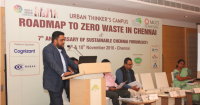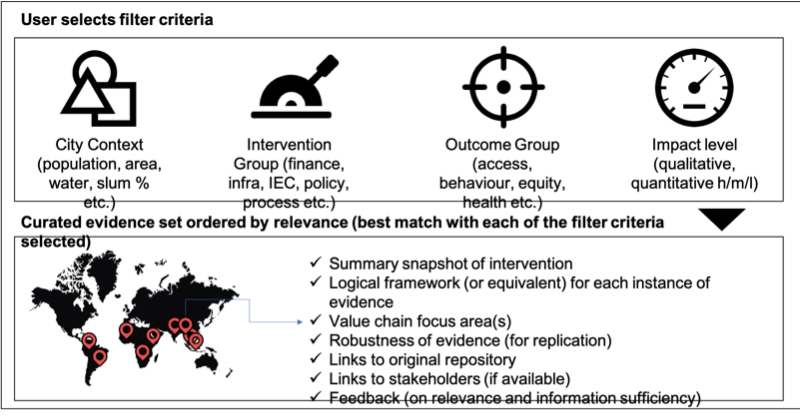- Forum
- categories
- Attitudes and behaviours
- Capacity development
- Knowledge management (KM) tools and approaches
- Program for better FSM by leveraging evidence - a global Learning and Peer Exchange Platform (LEAP)
Program for better FSM by leveraging evidence - a global Learning and Peer Exchange Platform (LEAP)
5464 views
- kowshikganesh
-
 Topic AuthorLess
Topic AuthorLess- Posts: 1
- Likes received: 0
As a part of its various knowledge management activities, the Bill and Melinda Gates Foundation is keen to create an effective knowledge management and peer learning system that will enable practitioners in the urban Faecal Sludge Management (FSM) ecosystem to better access, contribute to and learn from existing sources of evidence and also empower the Foundation to better channelize resources towards ‘under-investigated’ areas. Towards this,
Athena Infonomics
is designing a global Learning and Peer Exchange Platform (LEAP). LEAP will serve as an aggregator of evidence (which we define as any documentation of results-focused interventions) in urban FSM across existing knowledge repositories, synthesizing insights on the kind of evidence that exists, and serving as a natural reference point to guide new research in the space.
Envisioned as an online tool, LEAP seeks to distinguish itself from existing repositories and knowledge management initiatives through its focus on evidence as a resource, as against the larger set of available resources such as decision support tools and guidelines. Users of the platform will be able to search for and explore different types of evidence across a range of knowledge repositories using a set of customized search criteria such as the types of interventions, and whether the outcomes were successfully achieved or not. The key objective would be to ensure that a user is able to inform the implementation of a particular intervention in their context through a study of evidence on its effectiveness, efficiency and other parameters of success, in similar contexts globally. This is depicted in the illustration provided.
The development of LEAP will be driven by a study of knowledge repositories and the evidence they contain. The first part of the study is focused on understanding how these repositories categorize and tag various types of evidence such as quantitative evaluations and case studies. The second part is focused on deep diving into the evidence itself, to create a template that captures the key characteristics of each piece of evidence. Some of the characteristics that will be captured are the city contexts, types of interventions, types of outcomes, results, and whether the evidence answers questions of effectiveness, efficiency, cost-effectiveness and equity. Based on the study, a crawler is planned to be developed that aggregates evidence from identified external repositories, and presents visualizations of intervention pathways and evidence robustness. While in the longer term the platform would be augmented with live exchanges of knowledge between peers, we plan to commence it with evidence from key sources of knowledge in the FSM space.
This approach has two broad components – a supply side component which identifies and aggregates supply of evidence, and a demand side which identifies key evidence needs and helps design the user interface. For the supply side component, we are in the process of reaching out to key repositories of knowledge/evidence in the FSM space to consolidate our understanding of the supply of evidence. Some of the repositories we are already in discussions with are SuSanA, WSUP, and 3ie. On the demand side, we are carrying out consultations with different user categories such as government agencies, private and non-profit implementation partners, and academic users
Towards this, we are keen to work closely with the SuSanA community on this initiative to understand what kind of functionalities would be most useful for potential users, especially given the varied kinds of users that currently form the community. Additionally, we would like for the community to be amongst the early users of the platform, and be closely involved in the testing of early versions to provide feedback on the utility and user-friendliness of the same. In this regard, we are excited about the chance to work together, and invite community members to reach out to us at This email address is being protected from spambots. You need JavaScript enabled to view it. to learn more about this initiative and explore opportunities for collaboration.
Envisioned as an online tool, LEAP seeks to distinguish itself from existing repositories and knowledge management initiatives through its focus on evidence as a resource, as against the larger set of available resources such as decision support tools and guidelines. Users of the platform will be able to search for and explore different types of evidence across a range of knowledge repositories using a set of customized search criteria such as the types of interventions, and whether the outcomes were successfully achieved or not. The key objective would be to ensure that a user is able to inform the implementation of a particular intervention in their context through a study of evidence on its effectiveness, efficiency and other parameters of success, in similar contexts globally. This is depicted in the illustration provided.
The development of LEAP will be driven by a study of knowledge repositories and the evidence they contain. The first part of the study is focused on understanding how these repositories categorize and tag various types of evidence such as quantitative evaluations and case studies. The second part is focused on deep diving into the evidence itself, to create a template that captures the key characteristics of each piece of evidence. Some of the characteristics that will be captured are the city contexts, types of interventions, types of outcomes, results, and whether the evidence answers questions of effectiveness, efficiency, cost-effectiveness and equity. Based on the study, a crawler is planned to be developed that aggregates evidence from identified external repositories, and presents visualizations of intervention pathways and evidence robustness. While in the longer term the platform would be augmented with live exchanges of knowledge between peers, we plan to commence it with evidence from key sources of knowledge in the FSM space.
This approach has two broad components – a supply side component which identifies and aggregates supply of evidence, and a demand side which identifies key evidence needs and helps design the user interface. For the supply side component, we are in the process of reaching out to key repositories of knowledge/evidence in the FSM space to consolidate our understanding of the supply of evidence. Some of the repositories we are already in discussions with are SuSanA, WSUP, and 3ie. On the demand side, we are carrying out consultations with different user categories such as government agencies, private and non-profit implementation partners, and academic users
Towards this, we are keen to work closely with the SuSanA community on this initiative to understand what kind of functionalities would be most useful for potential users, especially given the varied kinds of users that currently form the community. Additionally, we would like for the community to be amongst the early users of the platform, and be closely involved in the testing of early versions to provide feedback on the utility and user-friendliness of the same. In this regard, we are excited about the chance to work together, and invite community members to reach out to us at This email address is being protected from spambots. You need JavaScript enabled to view it. to learn more about this initiative and explore opportunities for collaboration.
Attachments:
-
 LEAP_usecase.png
(Filesize: 135KB)
LEAP_usecase.png
(Filesize: 135KB)
Please Log in to join the conversation.
You need to login to reply
Share this thread:
- Forum
- categories
- Attitudes and behaviours
- Capacity development
- Knowledge management (KM) tools and approaches
- Program for better FSM by leveraging evidence - a global Learning and Peer Exchange Platform (LEAP)
Recently active users. Who else has been active?
Time to create page: 0.100 seconds







